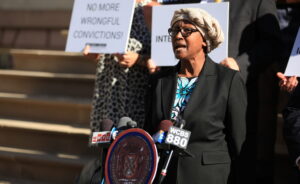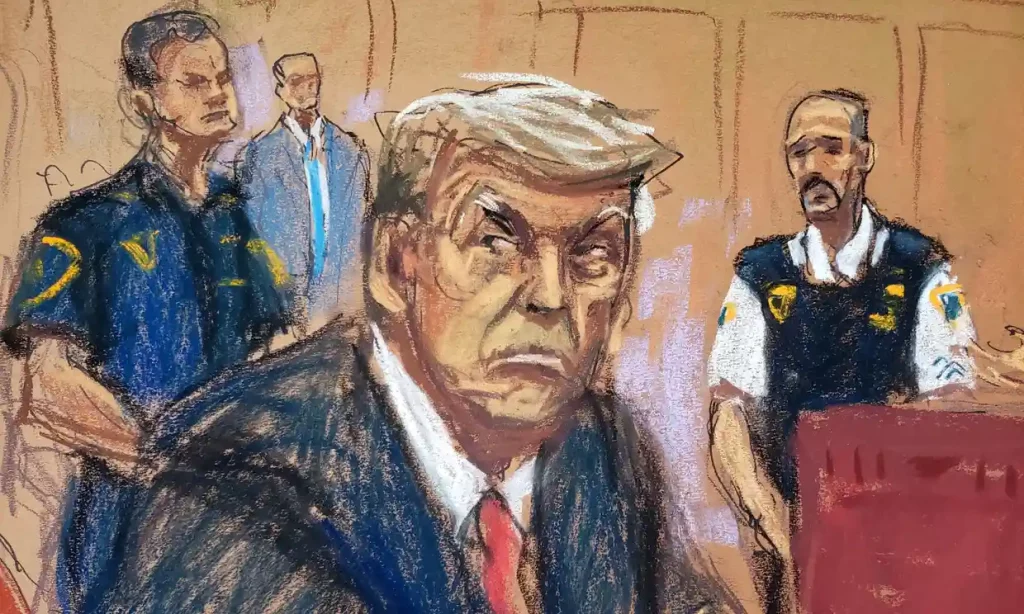
Trump's courtroom sketch from Jane Rosenberg. Photograph: Jane Rosenberg/Reuters
New York, NY — Everyone loves fixating on a scandal. So it’s no surprise that the news of former President Trump’s indictment has flooded our social media feeds, television news channels and radio networks. Not every day is a former U.S. President linked to a porn star or Playboy Playmate concerning the violation of campaign finance laws. But besides public humiliation, what is the penalty for this kind of transgression?
In the early nineties, when former President Bill Clinton was impeached over lying to the American public about his affair with White House Intern Monica Lewinsky, the repercussions were dire. Clinton, eventually, was impeached. But his impeachment was not necessarily a consequence of the affair. Instead, he was penalized for lying to the American public. Fifteen years later, we find ourselves looking at a similar situation; except this time, it involves money. This inclusion makes the legal details of Trump’s indictment a bit more complicated than the American public gives it credit for.
What did Trump do?
“The People of the State of New York allege that Donald J. Trump repeatedly and fraudulently falsified New York business records to conceal crimes that hid damaging information from the voting public during the 2016 presidential election,” said District Attorney Alvin Bragg.
District Attorney Bragg Takes Action
For years, Trump and his lawyers have stalled the lawsuit. While Trump remained in the White House, a 130,000 payment was made by Michael Cohen — Trump’s personal attorney — to porn star Stormy Daniels.
But why the payment? Prosecutors allege it was part of an illegal conspiracy to suppress information. Now, they’re charging him with “ falsifying business records.” And it isn’t just one instance. Trump is being charged with doing this multiple times, making him a repeat offender.
Trump Indictment – What to Know
What are the consequences?
On March 30, 2023, a Manhattan Grand Jury indicted Donald Trump for his involvement in a hush money scandal during his 2016 presidential campaign. He currently faces 34 felony charges of falsifying business records.
Unpacking the seriousness of Trump’s alleged crimes is more complex than you think. Americans are divided on this matter. Surprisingly, paying hush money during a campaign is not necessarily illegal. It’s called a “non-disclosure agreement,” which is entirely legal. However, the expenditure must be appropriately logged. Furthermore, it is unlawful to make an unreported donation of more than $2,700.00. Stormy Daniels and Karen McDougal’s pay off’s far exceeded that threshold, as Daniels received $150,000 and McDougal $130,00.00. The payments were issued to ensure these women remained silent and did not publicize any damaging allegations about former President Trump. Additionally, Trump’s personal lawyer Andy Cohen plead guilty to involvement in these undisclosed payments to McDougal and Daniels. In fact, they were made in his name. Ultimately, Cohen spent time in jail for these dubious campaign finance charges. However, since the campaign contribution was on Trump’s behalf, it’s sensible for charges to be brought against him too. Cohen declared that both payments were made at the request of Donald Trump, neither of which was included in campaign finance reports.
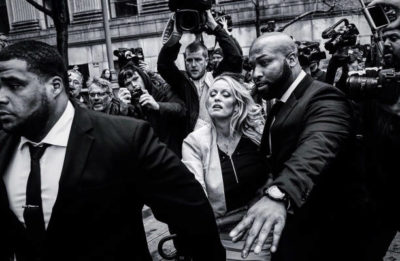
Trump’s advisors and allies are now expressing concerns about the likelihood of a fair trial because of Manhattan’s leftward-leaning demographic. However, given the former President’s legal trouble and concerns over fair treatment, some New Yorkers reflect on Trump’s past attitude towards those who faced legal trouble as well.
Trump & the Central Park Five
In 1989 five black and Latino young men were wrongly convicted of gang-raping and severely beating a 28-year-old white female jogger, Patricia Ellen Meili. Meili’s injuries were so severe that she remained in a coma for 12 days. Police rounded up 20 local teenagers and brought them in for questioning. While the five teenagers were in custody, they had neither a legal representative nor a parent/guardian present. The teenagers were then beaten and coerced into confession, landing some in jail for over a decade.
In 2021, a man named Matia Reyes met one of the wrongly convicted men at the Auburn Correctional Facility in New York. Reyes informed a corrections officer at the facility of their innocence, confessing that it was he who raped Meili. He also admitted to committing the act alone. Ultimately, DNA evidence corroborated his story, and the Central Park 5 were set free. Their convictions were finally vacated by New York Supreme Court Justice Charles J. Tejada on December 19, 2002.
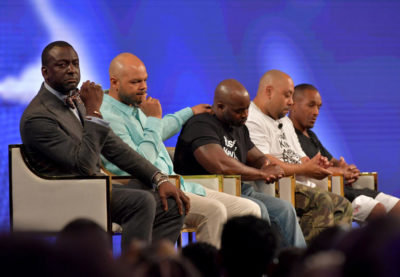
Bringing it full circle
Lawyers for the five defendants claim that Trump’s advertisements in 1989 strongly influenced public opinion about the case. In 1989 Trump stated that the “murderers” deserve the death penalty for their crimes. He spent about $85,000.00 purchasing full-page ads in four New York City newspapers, including the New York Times. These advertisements stated in large, bold font, “BRING BACK THE DEATH PENALTY.”
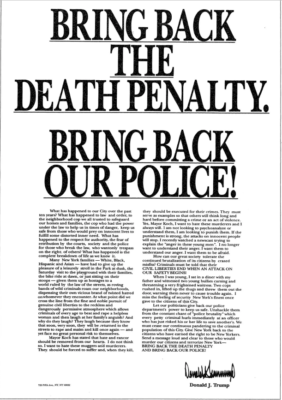
“I want to hate these murderers, and I always will,” Mr. Trump wrote in his May 1989 ad. “I am not looking to psychoanalyze or understand them; I am looking to punish them.
Even after Central Park 5 was found innocent, Trump showed no remorse. After a Netflix documentary, “When They See Us,” was released highlighting the racial injustice and unfair treatment these young men received, Trump doubled down on his stance and contribution to their convictions.
“You have people on both sides of that,” he said at the White House in 2019. “They admitted their guilt.”
Partial Treatment?
Donald Trump is now the first former U.S. President to be indicted. And staunchly, he announces innocence, claiming the indictment and arraignment are part of a political “witch hunt. He blames Biden and a Democratic rigging of the judicial system for the entire ordeal.
Republican politicians have largely defended the former president or been careful to dodge any form of Sen. Lisa Murkowski of Alaska recently stated, “No one is above the law in this country, but everyone deserves a fair legal process.”
As always, and especially in the case of former President Trump, Fair is a loaded word. Parting with legal custom, on March 30, Trump was not handcuffed, nor did he take a mugshot.
Sources



